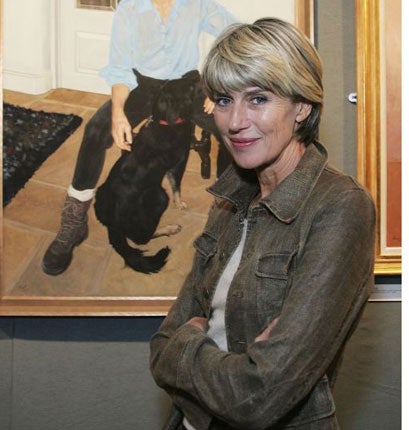You won't see women going grey in front of the cameras
Female broadcasters speak out against sexism and ageism in industry

For female broadcasters, it is a truth universally, and unhappily, acknowledged: after the first wrinkles and grey hairs they can start counting down their days before the camera.
For male colleagues, the story is different. Grey hair and craggy skin are marks of distinction, and careers can continue to flourish.
Yesterday, concern over the disparity flared up, with a series of high-profile women speaking out against "sageism" – what they see as a toxic combination of sexism and ageism – by which competent and popular female broadcasters are shunted into the sidelines.
The former Five news presenter Selina Scott said that, despite nearly 35 years of anti sex-discrimination legislation, ageism remains rife in television. Last December, 57-year-old Ms Scott won a landmark out-of-court settlement and an apology in an age-discrimination suit against the TV channel after it reneged on a deal for her to cover for Natasha Kaplinsky during maternity leave.
"Companies want to employ only young people, so ageism has gone underground," Ms Scott said. "It has become institutionalised and it is pervasive. Like mercury, you can see its insidious manifestation everywhere, but try getting a grip and it slips away... A senior producer told me it was comparable to McCarthyism in Hollywood in the early Fifties – a witch-hunt in which anyone accused of communist sympathies had their careers destroyed."
Ms Scott argues that TV is responsible for controlling perceptions of women. "It manipulates us in a subliminal way. In its casual disregard of older employees, particularly women, and in the glamour it bestows on youth, it reinforces prejudice."
When Moira Stuart was removed from her newsreading slot on the BBC current affairs programme Sunday AM, amid rumours that – at 57 – she was considered "too old", the public rose up in her defence. But two years on from the political and media row, the problem has not gone away.
The arts TV presenter and journalist Mariella Frostrup said she was resigned to the reality of her sell-by date. "Pretty much every day I say to my husband: 'This is great for as long as it lasts.' But I know there's no way I'm going to be on TV when I'm 60, unless it's on I'm a Celebrity ... Get Me Out of Here!" said the 46-year-old.
Andrew Marr, 49, the current affairs presenter, said last night that the culling of female presenters beyond middle age needed to be addressed. "There's no doubt that men have been able to carry on looking wrinkly and authoritative in a way that women haven't," he said. "The idea that someone can't appear on TV if they're female and over 50 is highly offensive. Looking across the range, how many older women do you see presenting the news? Far too few."
Ulrika Jonsson, whose career has taken a downturn since her heyday, said recently that the problem had much to do with changes in what was expected of female TV presenters. Asked by Piers Morgan on his ITV show if the next generation were as good at presenting, 41-year-old Ms Jonsson said: "They haven't had the same training and they haven't got the same experience, no. If the style of TV nowadays is to be all wacky and a bit ad-libby and undisciplined, then so be it, but I'm not part of that scene."
Join our commenting forum
Join thought-provoking conversations, follow other Independent readers and see their replies
Comments